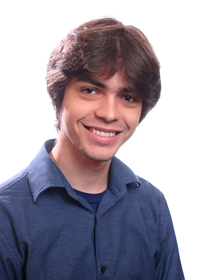
Summary of Research
Distributed memory parallel programming on heterogeneous HPC clusters is hard, even for computer scientists. For domain scientists, it is even harder. Instead of expecting domain scientists to manually parallelize their applications, it would be better if they could rely on a library of optimized parallel routines to do the job. However, the workloads found in scientific applications are diverse, so how could one library provide enough functionality to parallelize general scientific applications?
By using an algebraic structure known as a semiring, it is possible to express many scientific computations in terms of parallel sparse matrix operations. Thus, through the flexible expressiveness of parallel sparse matrix operations, it is possible to parallelize diverse scientific applications. However, for this strategy to be effective, a library of fast parallel sparse matrix routines is needed.
My research focuses on developing distributed sparse matrix routines uniquely suited for modern exascale supercomputers through the application of novel techniques to reduce communication volume, improve load balancing, and more effectively exploit high-bandwidth interconnects between GPUs on the same compute node.
Publications
McFarland, Thomas, Julian Bellavita, and Giulia Guidi. "Parallel GPU-Enabled Algorithms for SpGEMM on Arbitrary Semirings with Hybrid Communication." arXiv preprint arXiv:2504.06408 (2025).
Bellavita, Julian, et al. "Popcorn: Accelerating Kernel K-means on GPUs through Sparse Linear Algebra." Proceedings of the 30th ACM SIGPLAN Annual Symposium on Principles and Practice of Parallel Programming. 2025.
Bellavita, J., Jacquelin, M., Ng, E. G., Bonachea, D., Corbino, J., & Hargrove, P. H. (2023, November). symPACK: A GPU-Capable Fan-Out Sparse Cholesky Solver. In Proceedings of the SC'23 Workshops of The International Conference on High Performance Computing, Network, Storage, and Analysis (pp. 1171-1184).
Castelló, A., Bellavita, J., Dinh, G., Ikarashi, Y., & MartÃnez, H. (2023). Tackling the Matrix Multiplication Micro-kernel Generation with Exo. arXiv preprint arXiv:2310.17408. To appear in IEEE/ACM International Symposium on Code Generation and Optimization (CGO) 2024.
J. Bellavita, C. Sim, K. Wu, A. Sim, S. Yoo, H. Ito, V. Garonne, E. Lancon, "Understanding Data Access Patterns for dCache System", 26th International Conference on Computing in High Energy & Nuclear Physics (CHEP2023), 2023.
Bellavita, J., Sim, A., Wu, K., Monga, I., Guok, C., Würthwein, F., & Davila, D. (2022, June). Studying Scientific Data Lifecycle in On-demand Distributed Storage Caches. In Fifth International Workshop on Systems and Network Telemetry and Analytics (pp. 43-50).
[BLIS Retreat 2022] Portable code generation and semi-automatic scheduling for BLIS microkernels with Exo, https://www.cs.utexas.edu/users/flame/BLISRetreat2022/section-8.html
J. Bellavita, A. Sim. K. Wu, (2022). Predicting Scientific Data Popularity Using dCache Logs
. ACM Student Research Competition, 2022.
Awards
Recipient of Cornell Fellowship, 2023 admissions cycle.
2nd Place, 2022 ACM Student Research Competition, Undergraduate Division.
